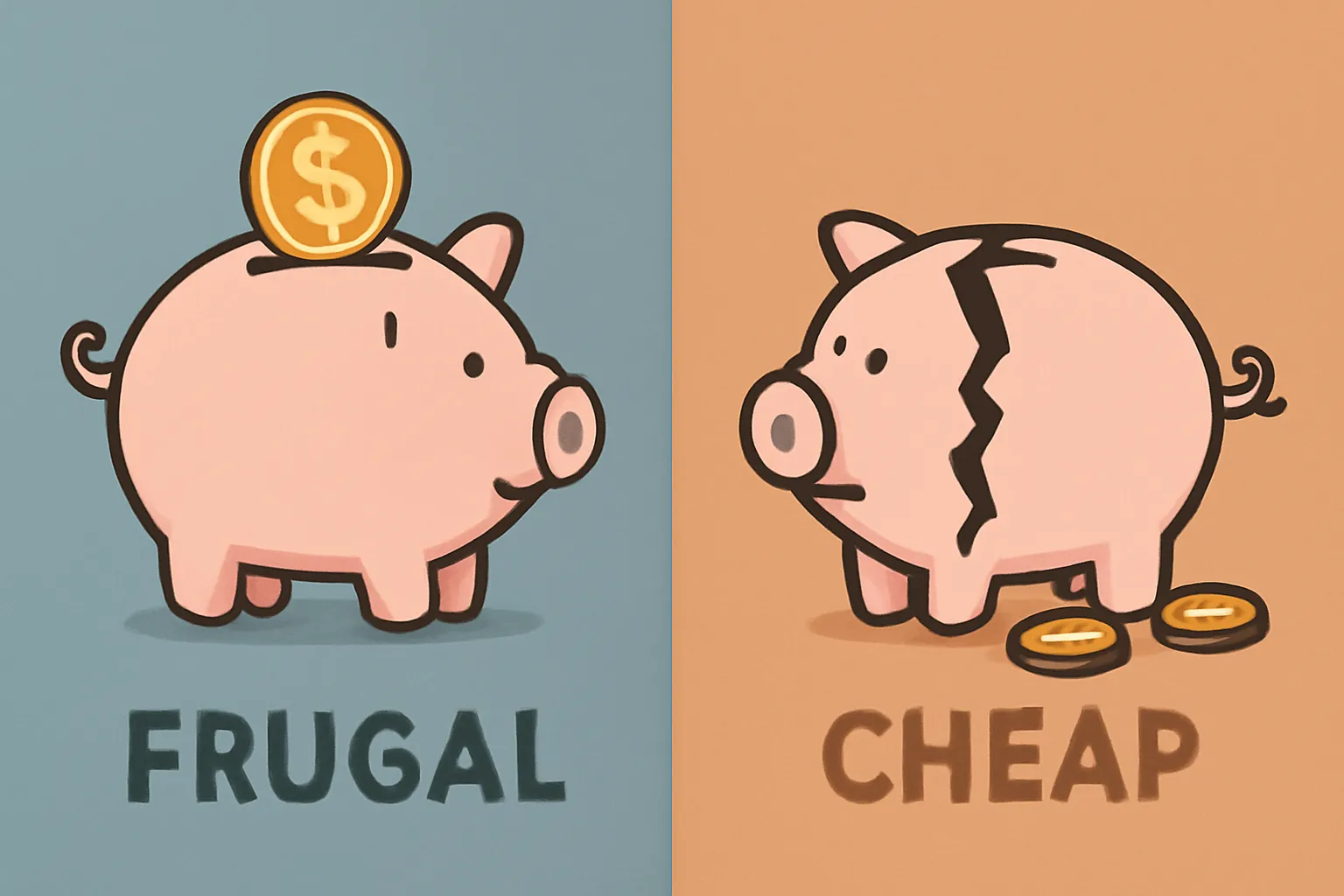Understanding the Difference: Frugal vs. Cheap
In a world where financial stability is increasingly important, people are searching for effective ways to manage their money. Terms like frugal and cheap are often used interchangeably, but there is a world of difference between them. Understanding these differences can help you adopt a healthy approach to saving money without compromising on your values, relationships, or quality of life.
Many people aspire to be wise with their finances, but sometimes, in an effort to save, they may cross the line into being cheap. This article will delve into the key differences between frugal and cheap behavior, why it matters, and how you can save money the smart way—by being frugal, not cheap.
What Does It Mean to Be Frugal?
Being frugal means being intentional and thoughtful with your spending. It’s about making conscious choices to maximize the value you get from every dollar. Frugality is not about deprivation; rather, it’s about prioritizing what matters most to you and cutting back on things that don’t align with your goals or values.
- Frugal people spend money where it counts, such as investing in quality items that last longer.
- They seek out deals and discounts but don’t sacrifice quality or relationships just to save a few bucks.
- Frugality is often associated with long-term thinking and planning.
In essence, being frugal is about making wise financial decisions that lead to greater security, satisfaction, and even generosity.
What Does It Mean to Be Cheap?
On the other hand, being cheap often means prioritizing saving money above all else, sometimes at the expense of quality, ethics, or relationships. Cheapness can manifest in behaviors that may seem selfish or short-sighted.
- Cheap individuals may avoid necessary expenses, even if it leads to bigger problems later.
- They might skimp on tipping, refuse to contribute to group activities, or buy the lowest quality items available.
- Cheapness is often associated with short-term savings that can result in higher long-term costs.
While saving money is a good thing, being cheap can damage relationships and even end up costing more in the long run.
Frugal vs. Cheap: Key Differences
To truly understand the debate of frugal vs. cheap, it’s important to look at the fundamental differences in mindset, behavior, and outcomes. Let’s break it down further.
1. Motivation and Intent
- Frugal: The motivation is to maximize value and spend wisely, focusing on needs, quality, and long-term benefits.
- Cheap: The intent is to spend as little as possible, often regardless of consequences or impact on others.
2. Approach to Quality
- Frugal: Willing to invest more in quality items that last longer and perform better, recognizing that this saves money over time.
- Cheap: Opts for the lowest price no matter what, even if it means buying items that break or wear out quickly.
3. Impact on Relationships
- Frugal: Understands the importance of generosity and reciprocity, and is willing to spend on shared experiences or help others.
- Cheap: May avoid contributing to group expenses, split hairs over small amounts, or shirk responsibilities to save money.
4. Short-Term vs. Long-Term Thinking
- Frugal: Makes decisions with the future in mind, seeking to avoid waste and maximize lasting value.
- Cheap: Focuses on immediate savings, often ignoring the long-term consequences or hidden costs.
5. Ethical Considerations
- Frugal: Considers the ethical implications of purchases, such as supporting fair labor or sustainable products.
- Cheap: May choose the cheapest option even if it involves unethical practices or exploitation.
Why the Distinction Matters
Understanding the distinction between being frugal versus cheap is more than a matter of semantics. It can have a profound impact on your financial health, personal relationships, and overall well-being.
- Frugality leads to better financial outcomes, as you invest in quality and avoid wasteful spending.
- Cheapness can result in lost opportunities, damaged relationships, and higher costs in the long run.
- Your approach to money can also reflect your values and influence your reputation among friends, family, and colleagues.
In short, being frugal is about smart, value-driven choices, while being cheap is about minimizing expenditure at all costs.
How to Be Frugal Without Being Cheap
If you want to save money the smart way, the goal should be to embrace frugality, not cheapness. Here are some practical strategies to help you achieve this balance:
Prioritize Your Spending
- Identify what matters most to you—whether it’s healthy food, education, travel, or hobbies.
- Allocate your resources accordingly, cutting back on less important areas to fund your priorities.
Invest in Quality
- Buy the best you can afford when it comes to items you use often, like shoes, appliances, or tools.
- High-quality items may cost more upfront but save money over time by lasting longer and performing better.
Be Generous Where It Counts
- Don’t skimp on generosity—whether it’s tipping service workers, contributing to group gifts, or supporting friends in need.
- Building strong relationships can lead to more opportunities and happiness in the long run.
Look for Smart Savings
- Use coupons, cashback apps, and loyalty programs to save on everyday purchases without sacrificing quality.
- Shop during sales, buy in bulk when appropriate, and compare prices to get the best deals.
Practice Mindful Consumption
- Buy less, but better. Avoid impulse purchases and focus on items that add real value to your life.
- Declutter regularly and donate or sell items you no longer need.
Repair, Reuse, and Repurpose
- Repair items instead of replacing them whenever possible.
- Find new uses for things you already own, reducing waste and saving money.
Be Transparent About Finances
- Communicate openly with friends and family about financial boundaries and expectations.
- Being honest can prevent misunderstandings and preserve relationships.
Real-Life Examples: Frugal vs. Cheap in Action
Sometimes, the best way to understand the difference between frugal and cheap is to look at real-world scenarios.
Dining Out
- Frugal: Orders water instead of a pricey drink, uses a coupon, and tips the server fairly.
- Cheap: Orders the cheapest item, avoids tipping, and complains about prices to avoid paying the bill.
Gift Giving
- Frugal: Finds a thoughtful gift on sale or makes something meaningful by hand.
- Cheap: Re-gifts a used or unwanted item, or skips giving altogether to save money.
Home Maintenance
- Frugal: Invests in preventive maintenance and quality repairs to avoid bigger expenses later.
- Cheap: Ignores problems until they become emergencies, leading to higher repair bills.
Travel
- Frugal: Uses points or finds deals on accommodations, but still pays for experiences that create memories.
- Cheap: Avoids travel altogether or stays in unsafe or uncomfortable places just to save money.
Common Misconceptions About Frugality and Cheapness
There are several myths and misconceptions that cloud the discussion around frugal vs. cheap. Let’s address a few:
- Myth: Frugal people are stingy.
Reality: Frugal individuals can be generous, especially with their time and resources. They simply prioritize spending in line with their values. - Myth: Cheap people are always poor.
Reality: Cheapness is a mindset, not a financial status. People of all income levels can exhibit cheap behaviors. - Myth: Frugality means never having fun.
Reality: Frugal people often have fun by finding creative, low-cost ways to enjoy life.
Understanding these differences can help you adopt habits that improve your life without alienating those around you.
The Psychological Side of Frugal vs. Cheap
Our attitudes toward money are shaped by our upbringing, culture, and personal experiences. The line between frugal and cheap is often influenced by psychological factors such as:
- Scarcity Mindset: People who have experienced lack or uncertainty may develop cheap habits out of fear, rather than necessity.
- Value Systems: Some individuals value thrift and resourcefulness, while others prioritize status or convenience.
- Social Influences: Peer pressure and societal expectations can impact how we approach spending and saving.
By reflecting on your own motivations and being honest about your goals, you can make more intentional choices about how you manage your money.
Long-Term Benefits of Frugality
Embracing a frugal lifestyle can lead to numerous benefits beyond just saving money. Here are some of the long-term advantages:
- Financial Security: By spending wisely, you can build up savings, reduce debt, and achieve your financial goals faster.
- Freedom and Flexibility: With less financial stress, you have more freedom to pursue your passions, travel, or make career changes.
- Environmental Impact: Frugality often goes hand-in-hand with sustainability, as you consume less and reduce waste.
- Personal Satisfaction: Making thoughtful choices leads to a greater sense of accomplishment and contentment.
- Stronger Relationships: Being generous and thoughtful with your resources can deepen connections with friends and family.
These benefits show that frugality is not about deprivation, but about living a more intentional, fulfilling life.
Potential Downsides of Cheapness
While it may seem like being cheap is a good way to save money, there are hidden costs associated with this approach:
- Poor Quality Purchases: Buying the cheapest option can lead to frequent replacements and higher costs over time.
- Damaged Relationships: Cheap behavior can create resentment among friends, family, or colleagues.
- Missed Opportunities: Reluctance to invest in yourself or experiences can limit personal growth and happiness.
- Negative Reputation: Being known as cheap can harm your social and professional standing.
In the long run, cheapness can cost you more than you save.
Smart Money-Saving Habits to Adopt
If you want to master the art of frugal living without falling into the trap of cheapness, consider incorporating these habits into your daily life:
- Create and stick to a budget that reflects your priorities and values.
- Track your spending to identify areas where you can cut back without sacrificing quality.
- Plan purchases in advance to take advantage of sales and avoid impulse buys.
- Learn basic DIY skills to repair or maintain items instead of replacing them.
- Negotiate bills and contracts to get better rates on services like insurance or utilities.
- Cook at home more often, saving money and eating healthier.
- Share resources with friends or family, such as tools, books, or streaming services.
- Buy used or refurbished items when appropriate, especially for big-ticket purchases.
- Set financial goals and regularly review your progress.
- Practice gratitude for what you have, reducing the urge to spend on unnecessary items.
These habits can help you maximize your savings while still enjoying life and maintaining strong relationships.
Conclusion: Choose Frugality Over Cheapness for a Better Life
The frugal vs. cheap debate is more than just a matter of words—it’s a reflection of your values, priorities, and approach to life. While both aim to save money, frugality is rooted in wisdom, intentionality, and generosity, while cheapness is often driven by fear, shortsightedness, or disregard for others.

